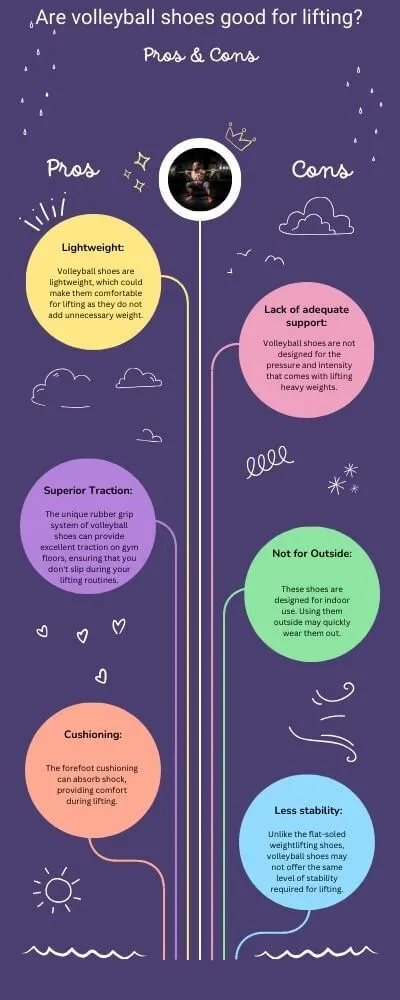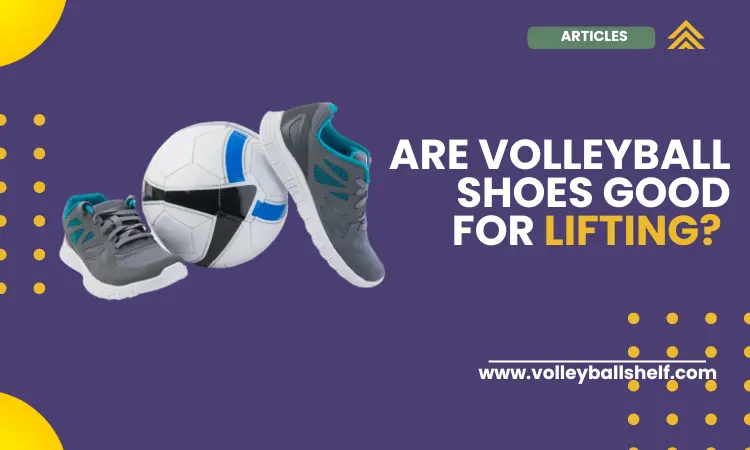Introduction
When you engage in diverse fitness activities, you may often wonder whether it’s essential to invest in specific equipment or if you can manage with multipurpose gear.
A particular concern for many fitness enthusiasts is the appropriateness of volleyball shoes for lifting. If this is your puzzle too, you are in the right place. In this comprehensive guide, we shall explore the intriguing question: “Are volleyball shoes good for lifting?“
Quick Response
Volleyball shoes are designed to provide stability and agility on the court, making them less suitable for lifting heavy weights. While they offer excellent grip and support for lateral movements in volleyball, weightlifting demands a different set of features, such as a solid, flat sole to ensure proper balance and minimize the risk of injury. It’s recommended to invest in specialized weightlifting shoes for a safer and more effective lifting experience.
The Intersection of Volleyball Shoes and Weightlifting
Most people’s perception of volleyball shoes revolves around agility, lightweight designs, and excellent grip systems, which are critical for the intense movements in the volleyball court.
On the other hand, weightlifting is viewed as a strength training activity that demands stability and robust support from shoes. So, how does the equipment for these two seemingly different sports intersect?
To begin with, volleyball shoes are primarily designed with a unique rubber that provides superior traction for indoor use. The grip system of these shoes is essential for side-to-side motions in the volleyball court, especially on the typical hardwood or plastic indoor volleyball court.
The forefoot cushioning provides shock absorption for the constant jumping and landing movements.
Lifting weights, however, demands different requirements from your shoes. Stability is crucial, especially for exercises like deadlifts that require a sturdy base.
Most weightlifting shoes are flat-soled, specifically designed to provide a strong grip on the gym floor. The weightlifter needs shoes that can bear the pressure of the weights and provide safety while ensuring proper form.
Balancing the Pros and Cons of Volleyball Shoes for Lifting
When we cross-examine the features of volleyball shoes in the context of weight lifting, we can identify certain advantages and disadvantages.

Pros
1. Lightweight:
Volleyball shoes are lightweight, which could make them comfortable for lifting as they do not add unnecessary weight.
2. Superior Traction:
The unique rubber grip system of volleyball shoes can provide excellent traction on gym floors, ensuring that you don’t slip during your lifting routines.
3. Cushioning:
The forefoot cushioning can absorb shock, providing comfort during lifting.
The Cons
1. Lack of adequate support:
Volleyball shoes are not designed for the pressure and intensity that comes with lifting heavy weights. They may not offer the needed support, which might compromise your form and safety.
2. Not for Outside:
These shoes are designed for indoor use. Using them outside may quickly wear them out.
3. Less stability:
Unlike the flat-soled weightlifting shoes, volleyball shoes may not offer the same level of stability required for lifting.
Volleyball Shoes vs. Gym Shoes
The design, material, and purpose of volleyball shoes and gym shoes differ significantly. While volleyball shoes prioritize traction, cushioning, and agility, gym shoes – also known as weightlifting or Cross shoes – prioritize support, stability, and balance. Gym shoes also have a firm heel to ensure safety while lifting heavy weights.
While the lightweight nature and superior grip of volleyball shoes may seem appealing, it’s important to note that these shoes are not designed for the pressure and intensity of weightlifting. The lack of adequate support may lead to potential injuries.
Precautionary Measures When Using Volleyball Shoes for Lifting
If you choose to use volleyball shoes for lifting, ensure that you take the following precautions:
1. Check the condition of your shoes:
: Inspect them for any signs of wear and tear, especially on the soles. A worn-out shoe may not provide the needed support or grip.
2. Proper form:
Pay extra attention to your lifting form. This can help prevent injuries.
3. Limit outdoor use:
Since volleyball shoes are designed for indoor use, using them outside may lead to rapid wear and tear.
Using Gym Shoes for Volleyball: A Consideration
If the dilemma is whether gym shoes can be used for volleyball, the answer is similar to using volleyball shoes for lifting – it’s not ideal. Gym shoes may be too heavy and lack the agility necessary for the intense, quick movements in volleyball.
However, if you’re on a tight budget or engage in multiple sports, you can consider shoes like Cross shoes, which offer a balance between the needs of different activities.
Shoe Options for Multiple Sports Disciplines
For those who engage in multiple sports disciplines, including volleyball and weight lifting, investing in sports-specific shoes for each activity may be impractical. In such cases, considering versatile sports shoes like Cross shoes or squash shoes may be a better option.
They offer a balance between agility, support, and stability, making them suitable for a range of sports activities.
The Final Verdict: Are Volleyball Shoes Good for Lifting?
To sum up, while volleyball shoes provide several advantages such as lightweight design and superior grip, they may not provide the required support and stability necessary for safe and effective weight lifting.
On the other hand, gym shoes, specially designed for weight lifting, offer a sturdy and stable base necessary for lifting weights.
In your fitness journey, prioritizing safety and performance is paramount. This underscores the importance of investing in sports-specific gear, including footwear, as it can have a profound impact on both your athletic capabilities and overall safety.
However, for those juggling multiple sports or on a budget, versatile sports shoes can be a good compromise. Keep in mind that each sport comes with its specific demands, and having a grasp of these subtleties can assist you in making well-informed decisions.



![What Volleyball Shoes Make You Taller? [Top 5 Picks]](https://volleyballshelf.com/wp-content/uploads/2023/09/What-Volleyball-Shoes-Make-You-Taller.webp)
![Do adidas volleyball shoes run big? [key reasons]](https://volleyballshelf.com/wp-content/uploads/2023/09/Do-adidas-volleyball-shoes-run-big.webp)
![How to make your volleyball shoes grip better? [3 Tips]](https://volleyballshelf.com/wp-content/uploads/2023/08/how-to-make-your-volleyball-shoes-grip-better.webp)
![Do Volleyball Shoes make you jump higher? [4 key features]](https://volleyballshelf.com/wp-content/uploads/2023/09/Do-Volleyball-Shoes-make-you-jump-higher.webp)
![Can you use volleyball shoes for basketball? [4 key differences]](https://volleyballshelf.com/wp-content/uploads/2023/09/Can-you-use-volleyball-shoes-for-basketball.webp)
![Navigating the Court: Volleyball vs Basketball Shoes [4 Tests]](https://volleyballshelf.com/wp-content/uploads/2023/08/Volleyball-shoes-Vs-Basketball-shoes.webp)